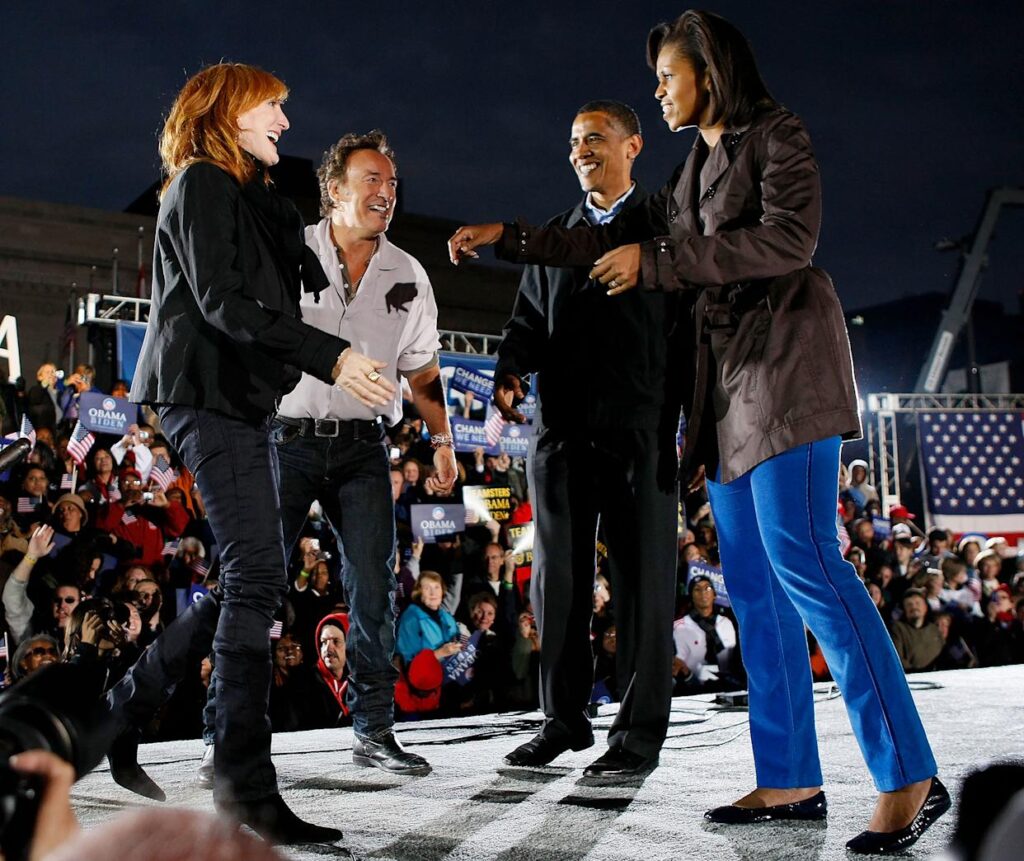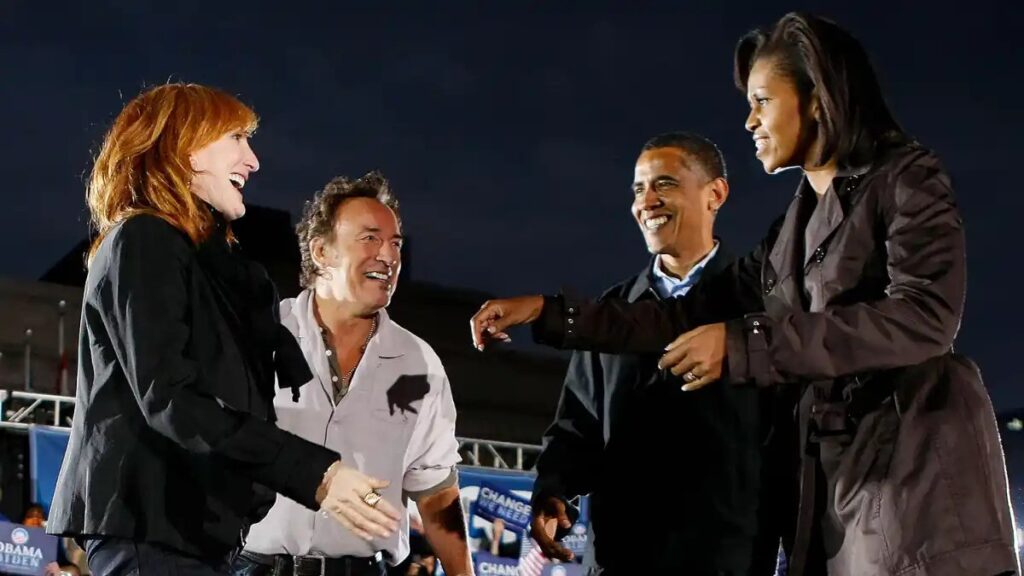In a heartfelt and revealing episode of her podcast IMO, Michelle Obama opened the door to her personal life in a way that few public figures ever dare. The former First Lady—author, lawyer, mother, and cultural icon—shared intimate details about her marriage to former President Barack Obama, the pressures of public scrutiny, and the surprising sources of inspiration that help keep her relationship grounded.
For many, Michelle and Barack Obama symbolize a modern-day power couple: smart, successful, loving, and resilient. From their early days in Chicago to the eight historic years in the White House, the Obamas have long been admired not just for their political partnership, but for the authenticity of their relationship. Yet, as Michelle candidly revealed on the June 11 episode of IMO, even the most iconic couples need guidance, support, and, at times, mentorship.
The episode, which Michelle hosted solo—without her usual cohost and brother Craig Robinson—featured none other than music legend Bruce Springsteen as her guest. What began as a conversation about music, family, and navigating fame eventually evolved into something far more personal. Michelle openly discussed the influence that Springsteen and his wife, singer-songwriter Patti Scialfa, have had on her marriage.
“I marvel at you and Patti and the work that you all have done,” Michelle told Springsteen during their candid exchange. “You and Patti have been couple mentors for me and Barack for quite some time.”
Springsteen, known more for his poetic lyrics and rock anthems than for dispensing marital advice, seemed surprised by the praise. “Woah, alright,” he replied with a chuckle.
But Michelle was serious.
“We’re watching you guys do the work, getting advice on how to keep those lines of communication open,” she said. “You’re two powerful people, two powerhouses in your own right, and merging those lives together—it’s not easy.”
Her words struck a chord not only with Springsteen but with listeners everywhere. In a world where celebrity relationships are often shallow or short-lived, seeing the Obamas look up to a couple like Springsteen and Scialfa—who just celebrated their 34th wedding anniversary—is both refreshing and relatable.
Just days before the podcast aired, Patti Scialfa shared a nostalgic post on Instagram celebrating the couple’s anniversary. She included a throwback photo and wrote, “Our one year anniversary…. Bruce surprised me with a beautiful party ….. today marks 34 years.” The timing of Michelle’s public acknowledgment couldn’t have been more fitting.

While Michelle’s admiration for Bruce and Patti was heartfelt and genuine, her comments also came against the backdrop of months-long speculation about the state of her own marriage. Earlier in the year, fans and critics alike began to whisper about potential trouble between the Obamas after Michelle noticeably skipped Donald Trump’s second inauguration.
Her absence did not go unnoticed—and unfortunately, it didn’t take long for social media rumors to explode. Some internet users speculated that her decision was more than political; they suggested it might be personal. Whispers of a possible separation or even divorce began to trend online. For a couple that has often been held up as a symbol of unity and strength, the rumors were not just unfair—they were deeply invasive.
Michelle addressed the speculation head-on in an April episode of IMO. It was a moment of raw honesty, a sharp departure from the polished public persona she often maintains.
“My decision to skip the inauguration—or my decision to make choices at the beginning of this year that suited me—were met with such ridicule and criticism,” she explained. “People couldn’t believe that I was saying no for any other reason. They had to assume that my marriage was falling apart.”
What Michelle was really expressing was something many women—especially those in the public eye—can relate to: the constant policing of their choices. Her decision not to attend Trump’s inauguration was hers alone, and yet, it was interpreted through the lens of her marriage, as though she could not exist independently of her husband.
This wasn’t just a case of celebrity gossip—it was a broader reflection of how women are often denied personal agency. Michelle’s remarks were a powerful reminder that even First Ladies, even bestselling authors, are not immune to gendered assumptions and intrusive scrutiny.
She made it clear that choosing herself, prioritizing her mental health, or simply needing space should not be seen as signs of weakness or relationship trouble. On the contrary, such decisions are often signs of strength and self-awareness—qualities that she and Barack have long championed in their public and private lives.

What emerged from Michelle’s podcast conversation was a nuanced, deeply human portrait of marriage—especially one forged under the pressures of public life. The Obamas, like all couples, have their ups and downs. They argue, they grow, they learn, and they work hard to stay connected. It’s that very realness that makes them so admired.
Michelle has often spoken about the challenges of marriage. In her memoir Becoming, she shared openly about couples counseling, parenting stresses, and the impact of Barack’s political career on their relationship. These aren’t the fairy-tale details people expect from a presidential couple, but they are the truth—and that’s what makes her voice resonate with so many.
In many ways, Michelle’s public acknowledgment of Bruce and Patti’s mentorship is also an acknowledgment of her own humility. It’s a reminder that no one has all the answers, not even the Obamas. And there’s no shame in seeking advice, learning from others, and surrounding yourself with people who have weathered similar storms.
Springsteen and Scialfa—who themselves balance fame, family, and creative ambition—offer a model of enduring partnership. For Michelle and Barack, watching another couple navigate those waters with grace and honesty is not just inspiring—it’s grounding.
The broader takeaway from this episode of IMO is a cautionary one. As a culture, we often forget that public figures are people, too. The same individuals who lead nations, perform on stages, or pen bestselling books are also spouses, parents, and friends. They have insecurities, joys, and challenges just like anyone else.
When Michelle chose to open up about the media’s reaction to her choices—and when she named Springsteen and Scialfa as her marriage role models—it was more than celebrity chatter. It was a moment of truth-telling in a world that too often rewards facade over vulnerability.
She reminded us that healthy relationships require effort, that even long-term love can benefit from mentorship, and that setting personal boundaries is not an act of rebellion—it’s an act of self-care.
Since leaving the White House, the Obamas have continued to be a fixture in American cultural life. From their Netflix productions to Barack’s A Promised Land and Michelle’s The Light We Carry, the couple has used their platform to uplift, educate, and inspire. Their marriage remains a key part of that legacy—not because it’s perfect, but because it’s real.
Michelle’s decision to speak candidly about marriage mentors and media scrutiny offers a new layer of insight into that legacy. She’s showing us that behind every strong partnership is a willingness to evolve, to seek wisdom, and to keep choosing each other every single day.
It also reaffirms something she’s said many times: marriage isn’t 50/50. Some days, it’s 70/30. Some days, it’s 20/80. What matters is the commitment to come back together, to communicate, and to keep doing the work.
As for the Obamas, they’re still doing the work. They’re still showing up for each other. And they’re still learning—from rock stars, from old friends, and from life itself.



